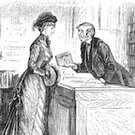Author: Charles Welsh Mason
Author: Charles Welsh Mason (1866–1951)
Alternate Name(s): Mr. M. (pseudonym); Julian Croskey (pseudonym)
Biography: One of the more interesting literary characters of the Victorian period. Charles Henry Alan Welsh Mason was born in 1866 in Buckinghamshire, the son of novelist Rev. Charles Welsh Mason (1831–1875) and Julia Beale. His father died when he was a young boy and he was sent to the Clergy Orphan School in Canterbury. He crammed for and failed the Indian Civil Service exam before heading to China as an assistant in the Chinese Maritime Customs in 1887. Five years later he threw away his career by helping to fund and organize a Chinese rebellion: inspired by Byron, Mason had romantic notions about wanting a "free and enlightened China." In late 1891, he was arrested, tried, and convicted of arms smuggling. After a year in prison, Mason returned to England in 1892 where he turned to literature under the pseudonyms "Mr. M." and "Julian Croskey" (a name drawn from one of his Chinese colleagues). His novels, all inspired by his experiences in China, include The Shen's Pigtail (1894) for Unwin's Pseudonym Library, The Chest of Opium (1896), Max (1897) about an opium addict, and The S.G.: A Romance of Peking (1900). In an article "One of the Lost Legion" (1898), Mason frankly recounts his years of literary poverty and struggle and ends by abandoning his literary career. He left England for Canada in 1897 where he joined the Klondike goldrush. After many adventures, Mason only made it as far as Ontario where he spent several months living alone on an island. Back in Ottawa, he married Frances Elizabeth Lambden in 1898 and the couple moved to Brooklyn, New York, where Mason worked as a journalist for a daily newspaper. The couple had three children. Around the turn of the century, Mason applied unsuccessfully to the Royal Literary Fund. After eight years, wanderlust struck Mason once again, but his wife refused to follow him and they divorced. Mason lived "as a hermit" in a cabin up the Hudson before turning to a series of menial jobs. Though nearly fifty years old, he served during the Great War, but it is unclear in what capacity. In 1920, a reporter found the former author roadbuilding in the U.S. By 1923, he had returned to England and lived as a hermit in Kent where he died in 1951. Late in life he published the first part of an autobiography The Chinese Confessions of Charles Welsh Mason (1924).
Author Tags:
References: Julian Croskey, "One of the Lost Legion," New Century Magazine (April 1898); Julian Croskey, "More from One of the Lost," New Century Magazine (January 1899); Charles Welsh Mason, The Chinese Confessions of Charles Welsh Mason (Richards Press, 1924); RLF (case number 2588); United States Census (1900, 1910); "Why Do Men Disappear?" Milwaukee Sentinel (17 October 1920); "Proud to be Robinson Crusoe," The Examiner [Tasmania] (21 October 1939)
Fiction Titles:
- The Shen's Pigtail and Other Cues of Anglo-China Life. 1 vol. London: T. Fisher Unwin, 1894.
- Merlin: A Piratical Love Story. 1 vol. London: William Beeman, 1896.
- The Chest of Opium. 1 vol. London: William Beeman, 1896.
- Max: A Novel. 1 vol. London: John Lane, 1897.
- The S.G.: A Romance of Peking. 1 vol. London: Lamley and Co., 1900.
